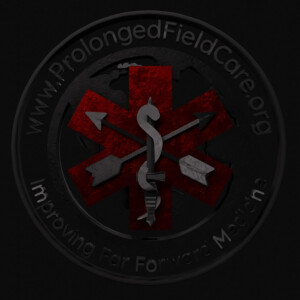
Prolonged Field Care Podcast 181: Burma Update
 2024-05-20
2024-05-20
In this conversation, Dennis interviews Victor about his experiences in Burma and his work with Free Burma Rangers. Victor discusses the changing dynamics of the conflict in Burma and the progress made by ethnic forces. He also talks about his role as a medic and the challenges of teaching combat medicine to indigenous groups. Victor emphasizes the importance of focusing on the basics and tailoring training to the specific needs of the students. He shares his experiences with teaching pressure points, tourniquets, casualty drags, and blood collection. Victor also reflects on the challenges of triage and decision-making in a mass casualty situation. During the conversation, Victor shares several lessons learned from his trip to Burma. He discusses the importance of going back to the basics and relying on ground reconnaissance when operating without ISR capabilities. He also highlights the need for movement and noise discipline to avoid detection by the enemy's reconnaissance planes and jets. Victor emphasizes the significance of good topside cover and concealment to protect against airstrikes and mortar attacks. He also talks about the challenges of providing prolonged field care and the importance of being mentally sharp and prepared for the continuous cycle of problems that arise during operations. Victor mentions the disbursement of medical equipment and the need for contingency plans in case of CCP destruction. Overall, the conversation provides valuable insights into the realities and complexities of operating in a hostile environment with limited resources.
Takeaways
The ethnic forces in Burma have been gaining ground and achieving significant victories in the conflict.
Teaching combat medicine to indigenous groups requires focusing on the basics and tailoring training to their specific needs.
Training on pressure points, tourniquets, casualty drags, and blood collection were essential for the indigenous groups in Burma.
Triage and decision-making in a mass casualty situation can be challenging, but it is important to prioritize casualties based on their chances of survival. Rely on ground reconnaissance and basic skills when operating without ISR capabilities
Maintain movement and noise discipline to avoid detection by enemy aircraft
Seek good topside cover and concealment to protect against airstrikes and mortar attacks
Be mentally sharp and prepared for the continuous cycle of problems during operations
Disburse medical equipment strategically and have contingency plans in case of CCP destruction
Here are some clips from Victor's experiences:
https://youtu.be/dBkTziMluyk?si=DIwvc-SAHCJ81hSM https://youtu.be/wNKHL_OJ4TMsi=vC1WoJWH_hhKme1h Thank you to Delta Development Team for in part, sponsoring this podcast. deltadevteam.com For more content go to www.prolongedfieldcare.org
Consider supporting us: patreon.com/ProlongedFieldCareCollective or www.lobocoffeeco.com/product-page/prolonged-field-care
More Episodes
Create your
podcast in
minutes
- Full-featured podcast site
- Unlimited storage and bandwidth
- Comprehensive podcast stats
- Distribute to Apple Podcasts, Spotify, and more
- Make money with your podcast
It is Free
- Privacy Policy
- Cookie Policy
- Terms of Use
- Consent Preferences
- Copyright © 2015-2024 Podbean.com






